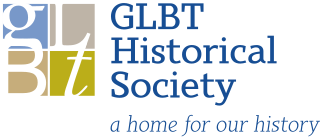
The homophile movement is a collective term for the main organisations and publications supporting and representing sexual minorities in the 1950s to 1960s around the world. The name comes from the term homophile, which was commonly used by these organisations. At least some of these organisations are considered to have been more cautious than both earlier and later LGBT organisations; in the U.S., the nationwide coalition of homophile groups disbanded after older members clashed with younger members who had become more radical after the Stonewall riots of 1969.

Lesbian feminism is a cultural movement and critical perspective that encourages women to focus their efforts, attentions, relationships, and activities towards their fellow women rather than men, and often advocates lesbianism as the logical result of feminism. Lesbian feminism was most influential in the 1970s and early 1980s, primarily in North America and Western Europe, but began in the late 1960s and arose out of dissatisfaction with the New Left, the Campaign for Homosexual Equality, sexism within the gay liberation movement, and homophobia within popular women's movements at the time. Many of the supporters of Lesbianism were actually women involved in gay liberation who were tired of the sexism and centering of gay men within the community and lesbian women in the mainstream women's movement who were tired of the homophobia involved in it.

One, Inc., or One Incorporated, was one of the first gay rights organizations in the United States, founded in 1952.
Feminist separatism is the theory that feminist opposition to patriarchy can be achieved through women's separation from men. Much of the theorizing is based in lesbian feminism.
Gaysweek was an American weekly gay and lesbian newspaper based in New York City printed from 1977 until 1979. Considered the city's first mainstream weekly lesbian and gay newspaper, it was founded by Alan Bell in 1977 as an 8-page single-color tabloid and finished its run in 1979 as a 24-page two-color publication. It featured articles, letter, art and poetry. It was, at the time, only one of three weekly publications geared towards gay people. It was also the first mainstream gay publication published by an African-American.
BLK was a monthly American newsmagazine, similar in format to Time and The Advocate, which targeted its coverage of people, events and issues to African-American LGBT readers.
The Salsa Soul Sisters, today known as the African Ancestral Lesbians United for Societal Change, is the oldest black lesbian organization in the United States.Operating from 1974 to 1993, the Salsa Soul Sisters identified as lesbians, womanists and women of color, based in New York City Arguments within the Salsa Soul Sisters resulted in the disbanding of the Salsa Soul Sisters into two groups, Las Buenas Amigas made for Latinas, and African Ancestral Lesbians United for Societal Change made for African-diaspora lesbians.

Azalea: A Magazine by Third World Lesbians was a quarterly periodical for Black, Asian, Latina, and Native American lesbians published between 1977 and 1983 by the Salsa Soul Sisters, Third World Wimmin Inc Collective. The Collective also published the Salsa Soul Sisters/Third World Women's Gay-zette.
Radical lesbianism is a lesbian movement that challenges the status quo of heterosexuality and mainstream feminism. It arose in part because mainstream feminism did not actively include or fight for lesbian rights. The movement was started by lesbian feminist groups in the United States in the 1950s and 1960s. A Canadian movement followed in the 1970s, which added momentum. As it continued to gain popularity, radical lesbianism spread throughout Canada, the United States, and France. The French-based movement, Front des Lesbiennes Radicales, or FLR, organized in 1981 under the name Front des Lesbiennes Radicales. Other movements, such as Radicalesbians, have also stemmed off of the larger radical lesbianism movement. In addition to being associated with social movements, radical lesbianism also offers its own ideology, similar to how feminism functions in both capacities.

The GLBT Historical Society maintains an extensive collection of archival materials, artifacts and graphic arts relating to the history of LGBT people in the United States, with a focus on the LGBT communities of San Francisco and Northern California.

Melvin Boozer was an American university professor and activist for African American, LGBT and HIV/AIDS issues. He was active in both the Democratic Party and Socialist Party USA.

The National Socialist League (NSL) was a neo-Nazi organization of gay men in the United States that existed from 1974 until 1984. It was originally founded by Jim Cherry, but was quickly taken over by Russell Veh, a neo-Nazi and transplant to Los Angeles, California, from Ohio. Veh financed the party using the profits from his printing business. He also financed the league with a film distribution unit that specialized in Nazi propaganda films, including Triumph of the Will. The National Socialist League had chapters in various parts of California, and implied in their mass mailing on July 4, 1978, that they had established an offshoot organization in Manhattan.

Martha Shelley is an American activist, writer, and poet best known for her involvement in lesbian feminist activism.

The Lesbian Herstory Archives (LHA) is a New York City-based archive, community center, and museum dedicated to preserving lesbian history, located in Park Slope, Brooklyn. The Archives contain the world's largest collection of materials by and about lesbians.
Shamakami was an early organization of South Asian lesbians and bisexual women based in the United States. They published a newsletter of the same name between June 1990 and February 1997.

Red Jordan Arobateau was an American author, playwright, poet and painter. Largely self-publishing over 80 literary works—often with autofictional elements—Arobateau was one of the most prolific writers of street lit, and a proponent of transgender and lesbian erotica.










